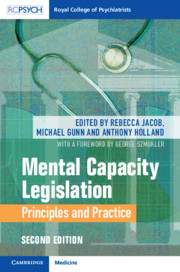Book contents
- Mental Capacity Legislation
- Mental Capacity Legislation
- Copyright page
- Contents
- Contributors
- Foreword
- Preface
- Editors’ Note
- Chapter 1 Introduction
- Chapter 2 The Assessment of Mental Capacity
- Chapter 3 Best Interests
- Chapter 4 Deprivation of Liberty Safeguards: Past, Present and Future
- Chapter 5A Mental Capacity Act Application: Hospital Settings
- Chapter 5B Mental Capacity Act Application: Social Care Settings
- Chapter 6 Mental Capacity and End of Life Decision-Making
- Chapter 7 Clinical Ambiguities in the Assessment of Capacity
- Index
- References
Chapter 7 - Clinical Ambiguities in the Assessment of Capacity
Published online by Cambridge University Press: 17 June 2019
- Mental Capacity Legislation
- Mental Capacity Legislation
- Copyright page
- Contents
- Contributors
- Foreword
- Preface
- Editors’ Note
- Chapter 1 Introduction
- Chapter 2 The Assessment of Mental Capacity
- Chapter 3 Best Interests
- Chapter 4 Deprivation of Liberty Safeguards: Past, Present and Future
- Chapter 5A Mental Capacity Act Application: Hospital Settings
- Chapter 5B Mental Capacity Act Application: Social Care Settings
- Chapter 6 Mental Capacity and End of Life Decision-Making
- Chapter 7 Clinical Ambiguities in the Assessment of Capacity
- Index
- References
Summary
Medical practitioners have long voiced their frustrations about the development of legal tests that are difficult to apply to clinical situations, as exemplified by this quote from Roth et al. (1977).
- Type
- Chapter
- Information
- Mental Capacity LegislationPrinciples and Practice, pp. 102 - 115Publisher: Cambridge University PressPrint publication year: 2019



